The Binding of Isaac
by Jeffrey J. Harrison
One of the most popular tourist sites in the Middle East is the ancient city of Petra in Jordan. Its name means rock, as in a steep, rocky cliff.* The city is well named, for it’s surrounded on all sides by steep, rocky cliffs of reddish-colored sandstone. In places, the rock is banded in layers that range from pink to purple. This in itself would make it an attraction. But the ancient residents added to its beauty by carving from these rocky cliffs some of the most beautifully decorated tombs the world has ever known. Many are of royal proportions, extending up to a height of forty meters and more with the most intricate decorations, all carved from the living rock.
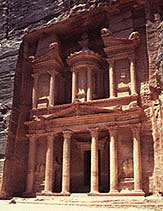
* This is the same Greek word used in Matt. 16:18 (petra) to describe the soaring rocky cliff
of faith on which Jesus said he would build his church.
The city was already famous in the time of the New Testament. This is when the apostle Paul most likely paid a visit, during his time in Arabia (Gal. 1:17).*
* Petra was the capital of the Nabatean kingdom of Arabia, which unlike the much larger modern Arabia, was restricted to parts of modern Jordan, southern Israel, and Egyptian Sinai. The Nabatean King Aretas is mentioned in Paul’s account of his visit to Damascus, which was also controlled by the Nabateans at the time (2 Cor. 11:32).
One of the things Petra was famous for was religion. High up above its cliffs were the city’s high places, where sacrifices and rituals took place on a regular basis throughout the year. These are some of the best preserved of the high places of ancient times mentioned in the Bible. Impressive processions once wound their way up steep steps cut in the rock to offer sacrifices to Dhu-Sharra (the god of Seir
), the chief god of the city, whose land was also known by the name of Edom.*
* Seir is one of the Biblical names for the land of Edom, within whose ancient borders the city of Petra is located.
The scholars who first studied Petra in modern times tended to romanticize the place, speaking of its inhabitants as a noble, peaceful people. That was until the discovery of evidence that among the sacrifices offered on these high places were human sacrifices. The prevalence of human sacrifice in the ancient world has only recently begun to dawn on scholars. Groups from Asia to America to Europe to Africa are now known to have engaged in human sacrifice, from the Celts of ancient France and England to the ancient Chinese and Japanese.
The Maya in South America were also once regarded by scholars as a noble people. That was until the discovery of the most horrific evidence of human sacrifice and ceremonial blood-letting. In Asia, Mongol warriors would sometimes eat the raw hearts or livers of their enemies to capture their spirits.
In India, child sacrifice was practiced to the goddess Kali. The list goes on and on. Human sacrifice was more the norm than the exception around the world.
In the lands of the Bible, Edom was not alone. The ancient Ammonites are also known to have killed their children in worship. This practice, mentioned in the Bible, has recently been confirmed by the excavation of an ancient temple near the airport in Amman, Jordan. Buried jars were found containing young human bones. The king of nearby Moab sacrificed his son on the walls of the city to turn away an attack of Israelites under King Jehoshaphat of Judah (2 Kings 3:27). The ancient Phoenicians, too, known as Canaanites in the Bible, practiced human sacrifice. Human bones have been found at one of their temples in ancient Carthage in Tunisia.
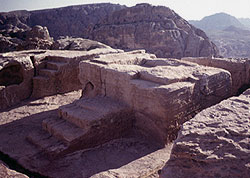
But it wasn’t only Israel’s neighbors that engaged in this horrific practice. The kings of Judah themselves made their children pass through the fire
(2 Kings 16:3, 17:17, 21:6, 23:10; 2 Chronicles 33:6). When I first heard this phrase, I assumed it meant some kind of initiation ritual. But in fact, it refers to child sacrifice. The site of this ritual in Jerusalem was known as Topheth, a place of worship deep down in the Gehinnom Valley, just to the south of the city (Jer. 7:31-32; 19:6,11-14). This is one of the reasons Gehinnom (Gehenna) became an image of eternal punishment in the teaching of Jesus and the rabbis (Matt. 5:22,29-30; 10:28; 18:9; etc. in the original language. For more on the difference between hell, Hades, and Gehenna, see our teaching: Hell, Hades, and Gehenna: A List of Verses).
The almost universal practice of human sacrifice is the historical context of God’s testing of Abraham in Genesis 22. God’s request that Abraham sacrifice his son reflected the common practice of many in the world in which Abraham lived. Wherever it occurred, human sacrifice was considered the highest form of sacrifice, and so took place rarely, as in the yearly sacrifice to Al-Uzza, a goddess who was also worshipped at Petra. This high regard for human sacrifice is referred to in an ascending list of sacrifices by the prophet Micah in the time of King Ahaz, the same king who introduced this horrible practice to Judah. What, the prophet asks, will gain the favor of God (Micah 6:6-7)? The burnt offering of calves (a higher quality sacrifice than the ordinary sheep and goats)? Or better yet, the sacrifice of thousands of rams (as King Solomon did at the beginning of his reign)?* What about offering tens of thousands of rivers of oil
—will that gain God’s favor? Or better yet, the sacrifice of a child: Should I give my first born for my sin, the fruit of my body for the sin of my soul?
(Micah 6:7).
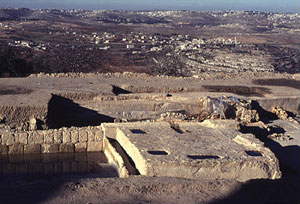
* 1 Kings 3:4. This took place at the great
high place of Gibeon, perhaps the site known today as Nevi Samuel on the outskirts of Jerusalem.
The offering of a first-born child ends the prophet’s list as the most precious possession one could ever give. Is this what would finally gain God’s favor? Some had begun to think so at the time the prophet was writing. But he answers the question with a resounding ‘No’! He has told you, man, what is good. And what does the Lord require from you, if not to do justice and to love kindness and to walk humbly with your God?
(Micah 6:8). Sacrifices do not impress God nearly so much as a righteous life. It’s difficult not to hear the Prophet Samuel’s rebuke ringing in your ears: To obey is better than sacrifice
(1 Samuel 15:22).
But Abraham, who lived a thousand years earlier, had no access to all this theological wisdom. Remember, Abraham was the first of the nation of Israel. Or as the rabbis taught, he was the first convert to Judaism. He came from a pagan world, in which even his own family worshipped false gods (Joshua 24:2). He knew only that the greatest sacrifice that could be offered to a god, and the highest sign of faithfulness to that god, was a first-born child offered up in sacrifice. And it was on the basis of this widely-held cultural belief that God made his request of Abraham: Take now your son, your only one, that you have loved...and offer him up there as a burnt offering
(Gen. 22:2).
In later years, it became embarassing to think of Abraham and the other patriarchs as lacking some of the most basic insights of Mosaic religion. So it became popular to imagine that they knew and obeyed the Law of Moses hundreds of years before it was given. The Book of Jubilees, an apocryphal writing from before the time of the New Testament, assumed that Abraham celebrated the Feast of Tabernacles, offered first-fruits, and offered sacrifices with drink and grain offerings in strict compliance with the Mosaic Law. The later rabbis advanced similar ideas.*
* But this attempt to glorify the past led to later problems: Among certain heretical groups, the failings of Abraham and the other patriarchs were considered distortions of the Biblical text. This led to the view of Islam that the Old and New Testament Scriptures have been corrupted.
But if Abraham was really so knowledgeable in the Law before its time, why would he even consider offering his own son as a sacrifice, something the Law itself forbids (You will not murder
; Exo. 20:13). This puts Abraham in the disturbing position of carrying out an order from God that he knows is wrong—as many modern readers imagine the story. Perhaps this is why Abraham is so often portrayed in films as a wild-eyed crazy man listening to voices. Interpretations like this have led some to imagine Abraham—or even God himself—to be some kind of psychopath. Even Christians often get from this story the idea that God asks us to do wild things that go against our better judgment. Others are inspired to listen for voices from God, convinced that the more radical and wild the instructions they receive, the more godly or spiritual the communication. But all these are horrible distortions of the Bible’s message.
The simple fact is that Abraham did not know all the law that would come hundreds of years later. He did not know that there was anything wrong with God’s request that he sacrifice his son. It was the norm in the culture around him, the highest expression of commitment you could offer to your god. God was dealing with Abraham according to Abraham’s level of understanding. But God’s purpose was to bring Abraham to a new level of understanding, through an experience that would eventually impact the entire world.
Genesis calls Abraham’s experience a trial (Gen. 22:1). But if human sacrifice was so widely accepted and practiced, in what way was it a trial? Not only did Abraham love his son; Isaac was also the son of promise—the one through whom God had promised to give Abraham many descendants (Gen. 17:19,21). But Isaac was still unmarried. If he died now, what would happen to that promise? The command and the promise of God seemed contradictory.
Abraham was not the last to experience this contradiction. It often seems inconceivable to us that doing things God’s way will result in the goal he has promised. But these are precisely the moments when we find out how much we really trust that God is God, and that his understanding is greater than ours. The New Testament says that Abraham resolved the conflict by believing that God, if necessary, would raise Isaac from the dead (Heb. 11:17-19).
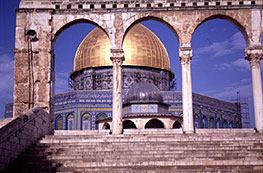
So Abraham saddled up his donkey and took his son, Isaac, whom God calls his only or unique
son, to offer him as a whole burnt offering (Gen. 22:2). Abraham’s goal, according to later Jewish tradition, was the city of Salem, which later came to be known as Jerusalem.* Here, near the city, he prepared to offer Isaac on the same hill where the Jewish Temple would later be built. This is the site today marked by the gold-topped Dome of the Rock.**
* Although the Bible itself mentions only that he went to the land of Moriah,
which is implied by the narrative to have been an uninhabited area.
** Tradition says that the large piece of bedrock jutting up from the floor of the Dome is the exact spot. The Muslims, however, who control the property, claim it was their ancestor Ishmael that Abraham prepared to offer here. This is one of the corruptions they claim exists in the Biblical text.
When he arrived, Abraham had to build the altar for the sacrifice (Gen. 22:9). This was nothing like the tables known as altars
in many churches today. Ancient altars were instead large, square piles of stone or earth with enough room for a man or even a cow on top. The dimensions for altars given in the Bible are 2½ meters (7½ feet) square and almost 1½ meters (4½ feet) high. This means it took quite some time to build and prepare: lots of time for Abraham to think deeply about what he was about to do.
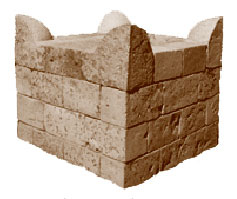
When all was prepared, with Isaac bound and laid out on the wood on top of the altar, Abraham picked up the knife to kill his son (Gen. 22:10). But the Angel of the Lord called to him from heaven, Don’t stretch out your hand against the boy and don’t do anything to him; because now I know that you are God-fearing; and you did not withhold your son, your only one, from me
(Gen. 22:12). Abraham had passed the test. But the lesson was just beginning.
For just at that moment, Abraham looked up and saw a ram caught in the brush by its horns, the provision of God to be offered in place of his son (Gen. 22:13). The message was clear: God does not require human sacrifice, but will accept a substitute instead. Abraham’s obedience led eventually to the abolition of child sacrifice not only in Israel, but later in Christianity and today even in the pagan nations of the world. In a very real and practical way, all the nations of the earth have been blessed because of Abraham’s obedience. As the Angel of the Lord went on to say: And all the nations of the earth will bless themselves* by your seed because of the fact that you have listened to my voice
(Gen. 22:18).
* Literally in Hebrew.
But what is this seed
mentioned by the Angel? Paul, using the interpretive techniques of the rabbis, says that this seed—written in the singular, not the plural—is the Messiah (Gal. 3:16). Notice the details: The son offered by the father is his only or unique
son. This is just what John 3:16 says about Jesus: that he is God’s only or unique
son, offered by God to be a blessing to the world.

The thicket
in which the ram was caught by its horns was part of the tangled scrub brush you can still see today in many places in Israel. This natural groundcover includes many different kinds of thorn bushes. Jesus, too, had a crown
of thorns around his head, just before he was offered up (Matt. 27:29).
The name of the offering requested by God is usually translated as burnt offering,
though this is more of an explanation than a translation (Gen. 22:2-3, etc.). In Hebrew, it’s called an olah (o-LAH), which means literally that which goes up
or that which ascends.
The idea was that the sacrifice ascends in the cloud of smoke to God. According to Acts 1:9, Jesus also ascended in a cloud to God (compare Daniel 7:13).
All the elements of the Christian message are here: the promised seed which is the Messiah, the only-begotten son of the father, the crown of thorns, a substitutionary atonement—even the resurrection, in that Abraham received back his son as from the dead (Heb. 11:19), and the ascension into heaven in the cloud.
But there’s more: The Angel of the Lord spoke again from heaven, saying that God would reward Abraham for his obedience by blessing his seed
with many descendants: I will surely multiply your seed as the stars of the heavens and as the sand that is on the shore of the sea
(Gen. 22:17). In other words, that singular seed, the Messiah, will be multiplied as the stars of the heavens. What is this talking about? The body of the Messiah, as described in Daniel 12:3: And those who have insight will shine brightly like the brightness of the firmament of heaven, and those who lead the many to righteousness like the stars forever and ever.
*
* This is also the understanding of Jeremiah, who prophesies that the seed (literally in Hebrew) of the Davidic Messiah will be multiplied as the angelic army of heaven and as the sand of the sea (Jer. 33:22).
This means that Abraham is not only the father of Israel, but of all those who come to his God by faith. As Paul says in Galatians: Know then that those who are of faith, these are sons of Abraham. But the Scripture, foreseeing that God would make the nations righteous by faith, announced the good news in advance to Abraham that, ‘All the nations will be blessed in you’
(Gal. 3:7-8). That good news is that you, if you are a believer in Jesus, are the fulfillment of the promise to Abraham, no matter what nation of the world you come from (Gal. 3:29). You are one of that number, like the stars of heaven, that the Angel of the Lord was talking about. You are part of the eternal plan and destiny of mankind that God revealed to Abraham.
And the rest of vs. 17? And your seed will possess the gate of his enemies
(Gen. 22:17). The Messiah, the promised seed,
will control the gate of his enemies. What is this talking about? In Matthew, Jesus says to Peter, On this rock (petra) I will build my church, and the gates of Hades will not overpower it
(Matt. 16:18). The gates of Hades, the place of death, are the gates of Messiah’s final enemy. But he will be victorious over them. As Paul says in 1 Corinthians, The last enemy that will be abolished is death
(1 Cor. 15:26). Or as Jesus himself puts it in Revelation, I have the keys of death and of Hades
(Rev. 1:18). That Jesus now holds the key to the gates of death is proved by his resurrection. And his victory will be complete when the dead are raised at his return. Then will come about the saying that is written,
(1 Cor. 15:55, quoting Hosea 13:14).Death, where is your victory? Death, where is your sting?
What an incredible revelation is contained in Abraham’s experience! Not only was it a picture of things to come. The one present with him and speaking these promises was himself the one that would fulfill them: the Angel of the Lord who speaks as God and who is God, whom the Christian faith identifies as the Son of God, the arm of God, the power of God, the radiance of God, who also took on flesh to become Jesus the Messiah. He is the one by whom all these things have and will come to pass.